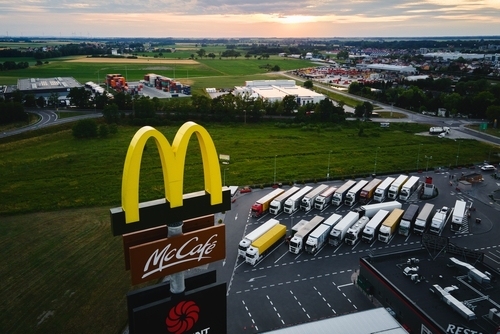McDonalds: What History Says About Restaurant Stocks and Food-borne Illnesses

McDonald's (NYSE: MCD) shares took a hit after the company's popular quarter pounders were linked to an E. coli outbreak in several Western and Midwest states. The U.S. Department of Agriculture believes that the onions used in the burgers were the likely source of the contamination.
The contamination has led to around 50 people falling ill and one death thus far. McDonald's, which has a strong history of food safety, nonetheless vowed to improve its safety protocols.
Meanwhile, the company has pulled quarter pounders from about 20% of its locations. McDonald's said it was working with suppliers to be able to bring back quarter pounders to its menu at these locations in the coming weeks.
Restaurant stocks and food-borne illnesses
While it's not a common occurrence for large publicly traded restaurants to have food-borne illness outbreaks, there are certainly a number of instances throughout the years where it has occurred. Let's look at some pertinent examples and see what it can tell us about McDonald's and its stock.
Jack in the Box: What is arguably the worst recorded incident of food-borne illness occurred at fast-food restaurant Jack in the Box in the early 1990s. Between 1992 and 1993, there were more than 700 illnesses and the death of four children linked to an E. coli contamination at the chain related to undercooked burgers.
Sales fell at the fast-food chain for four straight quarters after the company announced it was culpable for the outbreak in January of 1993, and it took three years for the company to return to profitability. Meanwhile, its stock went from around $7 at the end of 1992 to a low of $1.69 in February of 1995. The stock returned to $7 in May of 1997.
Chipotle: The biggest food-borne incident over the past decade occurred at Chipotle in 2015 when numerous customers were sickened by E. coli. Meanwhile, about a month later, more than 100 students in Boston became sick with norovirus after eating at the restaurant. The company later paid a $25 million fine to settle criminal charges related to the outbreaks.
The incidents greatly bruised the popular Mexican food chain, which saw sales plummet in the aftermath. A year after the incident, the company reported a massive 22% decline in quarterly same-store sales, and its stock was down 45%. The stock, meanwhile, would not fully recover until the middle of 2019. From there, however, the stock would go on to quadruple.
Wendy's: The most recent major food-borne illness occurred at Wendy's in August of 2022 when an E. coli outbreak believed to be related to romaine lettuce on its sandwiches sickened over 100 people in four states.
The incident, however, didn't have a major impact on its sales, with its third-quarter 2022 same-store sales climbing 7.7%. While Wendy's shares initially dipped, the stock quickly recovered and were higher before the incident by year-end 2022.
Taco Bell: Another well-documented incident of E. coli occurred at Taco Bell, owned by Yum Brands, back toward the end of 2006. After more than 70 people became ill from lettuce, the chain saw a drop in sales. Taco Bell's same-store sales slid in the quarters immediately following the incident as the negative publicity continued to weigh on traffic to its restaurants.
The stock immediately fell in the aftermath but quickly recovered despite the subsequent pressure on its same-store sales.

Image source: Getty Images.
What this means for McDonald's
The first thing to glean from the above food-borne illness incidences is that today, all those stocks are exponentially higher than they were before the incidences took place. While the timing varied, all were able to recover and then prosper. As such, history says the long-term impact on McDonald's and its stock will be negligible.
In the near term, however, it likely will have an impact on the company's same-store sales over the next several quarters. If the incident turns out to be pretty isolated, the stock should recover pretty quickly. The biggest issues with Chipotle was that its initial incident was followed by other illness scares, including one in 2018, while Jack in the Box's incident was massive and killed children.
The Wendy's and Taco Bell incidents seem a bit more akin to what McDonald's is currently experiencing. I think investors can continue to wait to see how this plays out over the next quarter or two, but history would indicate that buying the stock in the quarters ahead would be a good idea for the long term.
MCD PE Ratio (Forward 1y) data by YCharts
Trading at a forward price-to-earnings (P/E) ratio of 23 times next year's estimates, the stock is within its recent historic range. Meanwhile, it will typically settle into a trailing P/E range between 25 to 30, so over the years as McDonald's continues to grow out its earnings-per-share (EPS) through new store expansion and increasing same-store sales, the stock should continue to be a solid long-term winner.








